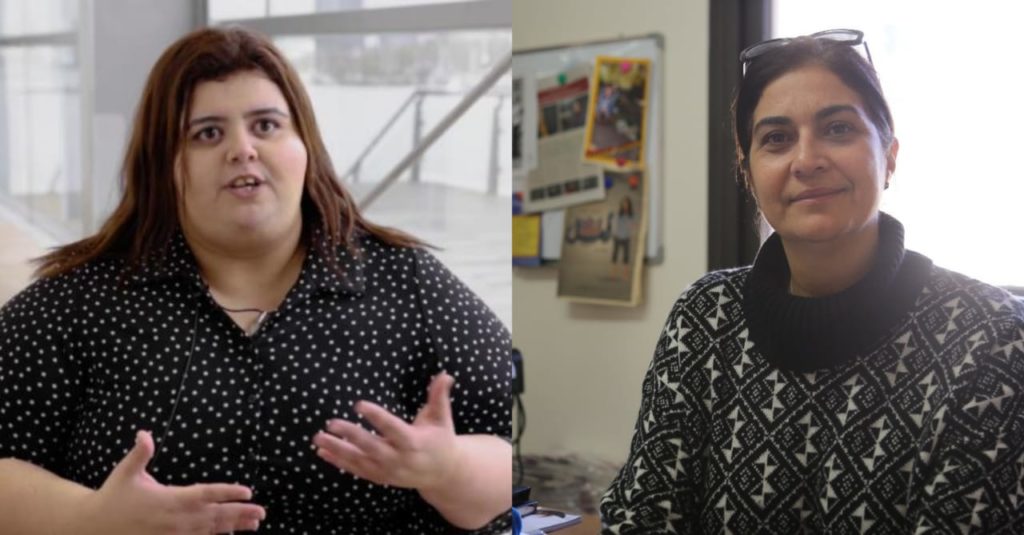São Paulo – Hala Bugaighis of Libya has been advocating women’s economic inclusion for six years now. Meanwhile, in Palestine – another Arab country –, for over a decade Maysoun Odeh Gangat has been running Nisaa FM, the region’s first radio station for women, which she founded herself. Despite living in different nations, they found that their life stories share many similarities, while speaking during the webinar “Arab Women Who Inspire,” hosted by the women’s committee of the Arab Brazilian Chamber of Commerce (ABCC) this March 8 to mark this International Women’s Day. Pictured above are Bugaighis (L) and Gangat.
On the date, historian and ABCC cultural director Silvia Antibas stressed the need to recognize the plurality of Arab women. “I often say that there isn’t just one Arab woman; there are several Arab women, each influenced by their own region and their own experiences,” she said.
In Libya, an incubator
This is the plurality that Hala Bugaighis works to support. In Libya, where 90% of resources originate from oil, she realized the role of women in families’ livelihoods. “In the 90s we started seeing businesswomen. Teachers, graduates, engineers, physicians. Women-owned businesses began to crop up, often out of need. The women had to support their families,” said Bugaighis, who holds a degree in Commercial Law and whose entrepreneurial streak led her to start two socially-oriented brands.
A feminist, she established the Jusoor Center for Studies and Development, a laboratory for the economic development and inclusion of women. Among other things, she created a jobs fair. “It was a great success. We have found job opportunities for almost 3,000 women.”
In 2018, Bugaighis started Leap, the first incubator for women-run business in Tripoli, the capital of Libya. The organization has since supported 850 women and incubated 130 different startups. “At Leap we help women through the very difficult endeavor of starting a business. We provide safety to these women who are often vulnerable,” she explained, adding that the incubator is working more and more with online businesses such as e-commerce startups.
In Palestine, a radio station
Helping women achieve financial independence is another pillar of the work done by Maysoun Odeh Gangat of Palestine. “I always believed that if a woman is economically empowered, she can be empowered all around. We work with this concept a lot. We had four or five projects in which we’d have online and radio campaigns for products by Palestinian female entrepreneurs. We also trained them to speak up, and we saw sales of these products go up because of their outspokenness,” she said.
The radio station also sheds light on the problem of gender violence. “We are working hard with female NGOs on different campaigns to discuss just that. We are also pressuring the government hard to pass a family protection act,” she said. The new law will protect women and children victimized by domestic violence in the country.
Gangat recalls that when the station was founded, in 2009, it took time and dedication to explain that the purpose of the work was equity. “The concept did not bode well with some people around here. They assumed we were encouraging women to rebel against men, but over time they realized that this station is amazing, and that it was working towards social equality and justice.”
Nisaa FM was established with support from the Womanity Foundation. In addition to radio content, the brand also puts out multimedia content via its website. It has won awards and accolades including the Ashoka Fellowship, the Synergos Fellowship, and the Clinton Global Initiative Fellowship. Gangat herself was the first Palestinian women ever to get the Schwab Fellowship, as well as the President Mahmoud Abbas Award.
The webinar also featured WAHI committee chair Alessandra Frisso and Claudia Yazigi Haddad, a director of both the committee and the ABCC. The discussion was moderated by ABCC Institutional Relations manager Fernanda Baltazar – another WAHI member.
Here’s more on the webinar:
Pandemic has impacted women’s lives in Brazil, Arab world
And here’s the full event:
Translated by Gabriel Pomerancblum




